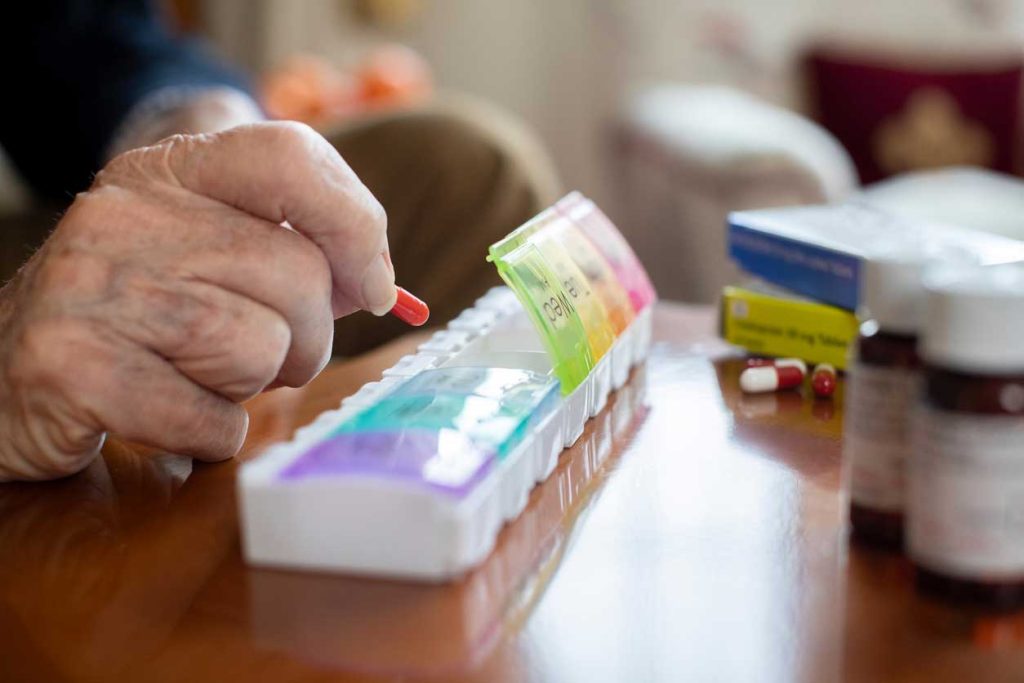
Medication Management for Elderly+ Problems and Importance
How to manage medications for seniors? Are you familiar with medication management for elderly? Did you know that more than 70 percent of the elderly need to take multiple medications? This statistic clearly shows the importance of proper medication management. Failure to properly manage medications can endanger the health and even the lives of the elderly. Therefore, families and caregivers play an important role in improving the quality of life of the elderly through proper medication management.
As they age, changes occur in the elderly’s body that affect the way they absorb and metabolize medications. This can lead to increased sensitivity to medications and the possibility of drug interactions. In addition, the elderly may forget to take their medications regularly due to memory problems or decreased cognitive abilities. Therefore, proper managing medications for aging parents can have a direct impact on their quality of life. In the rest of this article from humanhealthmag, we will examine key and scientific solutions for this important matter. We will also introduce the best methods of medication management.
The Importance of Medication in the Elderly
In general, medication management for the elderly is very important. Usually, most elderly people use medication, so the elderly nurse or the elderly family should have correct and sufficient information about the correct use of medications, because this is directly related to the health of the elderly.
The elderly doctor basically recommends that the elderly themselves, if they are sufficiently alert, be able to know their medications. In the meantime, people who live alone and their children are far from them can have a better life with Choosing caregiver for elderly parents and take their medications at the right time. The importance of medication use in the elderly is for the following reasons:
- Maintaining general health: The elderly often need medications due to physical weakness and increased risk of diseases. Proper use of medications can help maintain the general health of these people.
- Controlling chronic diseases: Many elderly people face chronic diseases such as diabetes, high blood pressure, and heart disease. Regular use of medications helps control these diseases and prevents their progression.

Challenges of Medication Management in Older Adults
The problems and challenges related to medication management for the elderly are numerous and we will mention some of them below.
Drug Interactions
- Many seniors take multiple medications at the same time, which can cause drug interactions and dangerous side effects. For example, medication must be used to managing anxiety in seniors. These medications must be taken on time and as directed by a doctor and should not interact with other medications.
Forgetfulness
- The elderly may forget medication doses or mistakenly take medications twice due to memory problems.
Vision and Hearing Problems
- It may be difficult for seniors to read the instructions on the medication packaging or hear the doctor’s advice.
Side Effects
- Increased sensitivity to medications in seniors can lead to severe side effects that require immediate attention.
The Importance of Drug Storage
One of the important points in medication management for the elderly is where to store medication. The place to store medication for the elderly should be cool and away from light and moisture; there is a general rule in this regard, which is that medication should be stored according to the conditions stated on the medication box. Elderly caregivers or their children should not store medications in the refrigerator, unless the doctor or pharmacist has told them to or it is stated on the medication label. Also, to avoid mistakes, do not give medications to the elderly in the dark and be sure to take the correct medication.
In addition, it is necessary to check the expiration date of medications and dispose of expired medications in the appropriate manner and with the guidance of the pharmacist. Note that elderly people should not chew, crush, or break pills, unless the doctor or pharmacist has given them permission to do so or it is stated on the pill label. Elderly people should inform their doctor if they have difficulty swallowing solid medications. Be sure to consult with the geriatrician before starting any medication. The doctor will prescribe the appropriate medication after examining your health condition and other medications you may be taking.
Important Points for Medication Management for Elderly
One of the important points in medication management for the elderly and the advice of doctors to the elderly family or caregiver is to make a list of the medications taken by the elderly and show this list to the elderly doctor. It is also better to place a copy of this list in the elderly’s home and have another copy with the elderly. This list for medication management at home can include the name of the medication, the name of the doctor prescribing the medication, the reason for prescribing the medication, the amount and time of taking the medication. Below are the most important points for Medication Management for Older Adults.

- Create a regular medication schedule: Using a table or apps that remind you when to take your medication can help the elderly take their medications on time. The medication schedule should include information such as the name of the medication, dosage, time of use, and precautions.
- Regular consultation with a doctor or pharmacist: It is essential to periodically review the elderly’s medications by a doctor or pharmacist. This can help identify drug interactions, adjust doses, and eliminate unnecessary medications.
- Use a medication box: Medication boxes with separate compartments for different days of the week and times of day are a practical way to reduce medication errors. These boxes are especially useful for seniors who have memory problems.
- Educate seniors and caregivers: Make sure seniors and their caregivers have adequate information about medications, side effects, and how to take them. Medication labels should be legible and written in plain language.
- Take care of the general health of seniors: A healthy diet, regular exercise, and adequate sleep can have a positive impact on the general health of seniors and reduce the need for some medications. Managing underlying conditions such as diabetes and blood pressure with the help of a doctor can also be very important. According to benefits of in-home care for elderly, this service can be used to care for seniors.
Tips for Caregivers
Caregivers and children of elderly people should be familiar with medication management for elderly. They should be in close contact with the elderly person’s doctor. Any changes in the elderly person’s health status should be reported to the doctor. You can hire a home nurse for your elderly person to stay with your loved one. You should also make a list of the elderly person’s medications and keep it up-to-date.
In addition, any signs of side effects should be reported promptly. Keep medications out of the reach of children and in appropriate places. Fortunately, today, there are several tools and technologies available for managing medications. Mobile apps can send reminders for when to take medications. Smart devices can also measure and deliver the exact dose of medication. Using these technologies can help reduce medication errors.
Concluding Remarks
Medication management for the elderly is a sensitive and vital process that requires great attention and care. With regular planning, consultation with a doctor, and the use of assistive devices, many problems caused by improper medication use can be prevented. With an effective medication management system, the elderly can experience a healthier and better quality of life. Taking medication in the elderly requires carefulness and complete knowledge of the individual’s medical condition. Consulting a doctor, following the instructions for use, and taking special precautions can improve the quality of life and health of the elderly.
Remember that taking medications correctly is one of the essential factors in promoting the health of the elderly. Taking medications for the elderly should be done with patience and care. The effects of medications in this group of people may vary, so following the doctor’s instructions and accurate information about each medication is essential. The elderly caregiver, children, or the elderly should only use one method to remember when to take medication.
Could you help us make this content even better? What do you love, and what can we improve? Share your thoughts below, feedback is the key to creating better content for YOU. If you also have an experience in this regard, please share it with us and others.

Frequently Asked Questions
Is There a Difference Between Taking Medications and Food?
Yes, some medications should be taken before or after meals. Follow your doctor’s instructions carefully.
Are all Medications Suitable for the Elderly?
No, not all medications may be suitable for the elderly. A doctor’s consultation is essential before taking any medication.
Is it Difficult to Take Multiple Medications at the Same Time?
Yes, taking multiple medications at the same time can increase the risk of drug interactions. It is best to consult a doctor.
Do the Elderly Need Vitamin Supplements?
Yes, in some cases, the elderly may need vitamin supplements, but medical advice is recommended before taking them.
Can Prescribed Medications be Changed on Your own?
No, any changes in medication intake should be made with the doctor’s consultation. Sudden changes can have serious side effects.
